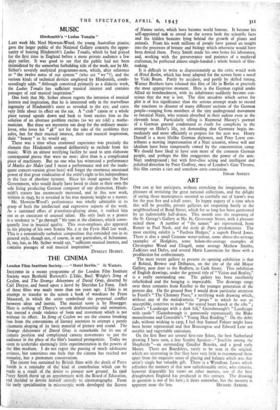MUSIC
Hindemith's "Ludus Tonalis "
LAST week Mr. Noel Mewton-Wood, the young Australian pianist,- gave the larger public of the National Gallery concerts the oppor- tunity of hearing Hindemith's Ludus Tonalis, which he had played for the first time in England before a more private audience a few days earlier. It was good to see that the public had not been intimidated by the somewhat forbidding tide of the work, nor by Mr. Seiber's severely analytical programme-note, which, after reference to 5` the twelve notes of our system " (who are " we "?), and the various kinds of technical devices employed by Hindemith, conde- scendingly adds. " Although conceived primarily as a didactic work, the Ludus Tonalis has sufficient musical interest and contains passages of real musical inspiration."
One feels that Mr. Seiber almost regrets the intrusion of musical interest and inspiration, that he is interested only in the marvellous ingenuity of Hindemith's score as revealed to the eye, and cares very little about its effect on the ear. A " crab " canon or a whole piece turned upside down and back to front excites him as the solution of an -abstruse problem excites (so we are told) a mathe- matician. But these are mysteries too deep for the ordinary music- lover, who loves his "48 " not for the sake of the problems they solve, but for their musical interest,_ their real musical inspiration, their " beauty " as he would say.
There was a time when emotional experience was precisely the element that Hindemith seemed deliberately to exclude from his music. With an almost terrifying facility he used to spin elaborate contrapuntal pieces that were no more alive than is a complicated piece of machinery. But no one who has witnessed a performance of Mathis der Mater (and I mean a performance and not the inade- quate concert-version given here) will forget the enormous emotional power of that great vindication of the artist's right to his independence in the face of absolute tyranny. Since his stand against the Nazi Government, who would dearly have loved to claim as their own the sole living producing German composer of any distinction, Hinde- mith's stature has enormously increased, and in this new work, Written in 1943,he is revealed at his true majestic height.as a master.
Mr. 'Mewton-Wood's performance was wholly admirable in its grasp of both -the intellectual and expressive aspects of the work. As a sustained effort of pianoforte-playing alone, it marked hint out as an executant of unusual talent. His only fault as a pianist is a tendency to " go through " his tone at the climaxes, which conse- quently lose in musical quality. This over-emphasis also appeared in his playing of his own Sonata No. 2 at the Fyvie Hall last week.. This is a romantically turbulent composition that reminded one in its general style; though not, of course, in any particulars, of Schuniann. It, too, has,' as Mr. Seiber would say, " sufficient musical interest, and contains passages of real musical inspiratiOn." DYNELEY HUSSEY.


























 Previous page
Previous page